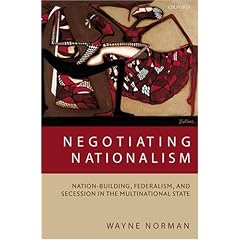 I'm reading Wayne Norman's 2006 book Negotiating Nationalism. Nation Building, Federalism, and Secession in the Multinational State. My interest - as always - lies in exploring the various attempts to understand nationalism and propose alternatives to its presence in our lives. I find Norman's book going in the same direction as Will Kymlicka's work (not surprisingly, since the two seem to have been working together) - a pragmatic approach to propose, justify and ultimately legitimate liberal political action moving away from ethnic politics/ nationalist solutions. I'm still not sure how one can ultimately divorce the institution of the state from the idea of the nation - I'm not saying it cannot be done, but I find it hard to see how it could be done, given the legitimation a politician can achieve by appealing to national identity, but also given the fact that many of the state's symbols are engineered to connect to this national identity.
I'm reading Wayne Norman's 2006 book Negotiating Nationalism. Nation Building, Federalism, and Secession in the Multinational State. My interest - as always - lies in exploring the various attempts to understand nationalism and propose alternatives to its presence in our lives. I find Norman's book going in the same direction as Will Kymlicka's work (not surprisingly, since the two seem to have been working together) - a pragmatic approach to propose, justify and ultimately legitimate liberal political action moving away from ethnic politics/ nationalist solutions. I'm still not sure how one can ultimately divorce the institution of the state from the idea of the nation - I'm not saying it cannot be done, but I find it hard to see how it could be done, given the legitimation a politician can achieve by appealing to national identity, but also given the fact that many of the state's symbols are engineered to connect to this national identity. Norman's definition of what makes a discourse nationalist is useful: the grounds/ sentiments to which a discourse appeals, whether explicitly or not make it nationalist ("any political issue... can become imbued with nationalist meaning and value" p. 12). Norman offers the example of demands for administrative control of immigration on provincial levels in Canada: British Columbia's demands are not nationalist, he says, because they are justified by a pragmatic need to accommodate an influx of Chinese-speaking immigrants. Quebec's demands however are nationalist because they are justified by a desire to integrate immigrants into the French-speaking culture (a nationalist rationale, justified by the greater aim of preserving Quebecois identity).
However, even in British Columbia's case, we still talk of state/ province (locals, citizens, legitimate constituents) vs. immigrants. It is still a matter of territorial arrangements, where the unit of governance is local, representing the people within it. The newcomers come from somewhere else; they bring a challenge to the local, a challenge which has to be managed somehow. And the challenge is a different language/ culture.
Nevertheless, this is an interesting and appealing approach for scholars of nationalism. It clearly argues that it is not the issue at stake which is 'nationalist' , but the way in which this issue (be it unemployment or housing or immigration) is being approached. If approached from the perspective of building or maintaining the nation, then it is nationalist.





No comments:
Post a Comment